Understanding the Financial Year
The financial year is a period of 12 months used for accounting and budgeting purposes by businesses, governments, and other organisations. It is not necessarily the same as the calendar year, which runs from January 1st to December 31st. The financial year can start and end on any date, depending on the organisation’s preference.
During the financial year, companies prepare financial statements such as income statements, balance sheets, and cash flow statements to assess their performance and financial health. These reports provide valuable insights into the company’s revenue, expenses, assets, liabilities, and cash flow over the specified period.
For tax purposes, businesses must report their income and expenses for the financial year to calculate their tax liability. Understanding the financial year is crucial for complying with tax laws and regulations to avoid penalties or fines.
Government agencies also operate on a financial year basis to plan their budgets and allocate resources efficiently. By aligning their fiscal year with the financial year, governments can track spending, monitor revenue streams, and ensure accountability in public finances.
In conclusion, the financial year plays a vital role in business operations and financial management. It provides a structured framework for accounting practices, budgeting decisions, tax compliance, and overall organisational planning. Understanding how the financial year works is essential for individuals and entities involved in economic activities.
Understanding the UK Financial Year: Key FAQs Explained
- What is financial year in UK?
- Why is the UK financial year April to April?
- What is the current financial year?
- What is the financial year for 2023?
What is financial year in UK?
In the UK, the financial year refers to the 12-month period used by businesses and organisations for accounting and financial reporting purposes. Unlike the calendar year, which runs from January 1st to December 31st, the financial year in the UK typically starts on April 1st and ends on March 31st of the following year. During this period, companies prepare financial statements to assess their performance, manage budgets, and fulfil tax obligations. Understanding the financial year in the UK is essential for businesses to maintain compliance with regulations, plan their finances effectively, and make informed decisions based on their financial data.
Why is the UK financial year April to April?
The UK financial year running from April to April is based on historical and practical considerations. The tradition of starting the financial year in April dates back to the Julian calendar, which was in use in England until 1752. April 5th was traditionally considered the start of the new year, known as Lady Day, and this date was used for tax and financial purposes. Over time, this practice evolved into the current system where the UK financial year begins on April 6th and ends on April 5th of the following year. This timing allows for a smoother transition between accounting periods, aligns with other key financial reporting deadlines, and facilitates efficient tax planning and administration for businesses and individuals in the UK.
What is the current financial year?
The current financial year refers to the ongoing 12-month period that an organisation or government is using for accounting and financial reporting purposes. It typically starts on a specific date and ends 12 months later. For example, in the UK, the financial year runs from April 6th to April 5th of the following year. Knowing the current financial year is essential for businesses, individuals, and government entities to accurately track their financial activities, prepare tax returns, and make informed budgeting decisions. Stay updated on the current financial year to ensure compliance with regulations and effectively manage your finances.
What is the financial year for 2023?
The financial year for 2023 typically refers to the 12-month period during which businesses, organisations, and governments will conduct their financial accounting and reporting activities. In most cases, the financial year for 2023 will begin on a specific date, such as April 1st or July 1st, and end on the same date in the following year. It is important for entities to determine their financial year for 2023 in advance to ensure proper planning, budgeting, and compliance with tax regulations. By understanding the designated financial year for 2023, businesses can effectively manage their finances, track performance metrics, and make informed decisions to support their long-term goals and objectives.

Leave a Reply